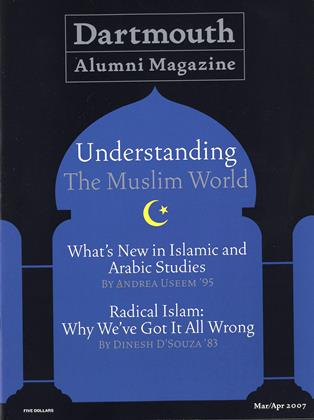Jazz Man
In 1970 legendary trumpeter Don Cherry left an indelible mark on Dartmouth’s music scene.
Mar/Apr 2007 MARK WEISS ’86In 1970 legendary trumpeter Don Cherry left an indelible mark on Dartmouth’s music scene.
Mar/Apr 2007 MARK WEISS ’86In 1970 legendary trumpeter Don Cherry left an indelible mark on Dartmouth's music scene.
SOME STUDENTS CALLED HIS INTRO ductory jazz class "Pots and Pans," because visiting professor Don Cherry taught the nonmusical students how to keep the beat.
"He had the football and rugby players all playing various types of percussion," Fred Haas'73 recalls." But he had them doing it well."
In 1969, when Cherry was 33 years old, he had a contract with Blue Note, the world's most prestigious jazz label. He had studied or collaborated with jazz legends such as John Coltrane, Ornette Coleman, Sonny Rollins, Thelonious Monk, Albert Ayler and Pharoah Sanders. And he had studied and performed
That year Dartmounth music professor Jon Appleton met Cherry at a recording session of Charlie Haden's Liberation Music Orchestra in New York and immediately set the wheels in motion to deliver Cherry to the College. Cherry spent the winter and spring trimesters of 1970 serving as a visiting professor in the music deparment. Bringing Cherry to Dartmounth remains a highlight of Appleton's career as a musician and educator,Appleton says.
During Cherry's two terms at Dartmouth the African-American and Choctaw Indian jazz trumpeter from Oklahoma taught more than 100 students and created Human Music, an experimental jass album, with Applton. Now,11 years after Cherry's death and 36 years after his time at the Colege, his former students and colleagues still remember the indelible impact he left on all who knew him.
Haas vividly remembers his beloved professor. "He was totally unselfconscious," he says. The most powerful as- pect oif Cherry's teaching style, according to Haas, was the way Cherry"closed his eyes and pulled you into his process. He drew the music out of people in an extraordinary way."
Haas says he was"especially taken by the way Cherry would get results and progress from the nonmusicians in the class," such as those athletes-turned-percussionists.
Cherry's classes performed public recitals, showing off what they had learned. Throngs of people came to Faulkner Recital Hall to watch Cherry's students play—audience members ranged from music aficionados to friends of classmates to the merely curious. One of his classes even visited Boston, where students performed their musical creation, "The Peace Piece."
Additionally, Cherry shared an entire world of jass with his students. His admirers boast that Cherry loved World Music long before it was considered an official genre. He brought guest performers to visit Hanover and play music with the class, such as Turkish percussionist Okay Temiz, Argentine saxophonist Gato Barbieri and South African bassist Johnny Dyani, whom Steve Herzfeld'73 remembers as an especially unique man who,"when he heard hoof beats, naturally thought of zebras."
Cherry's appreciation of World Music inspired his and Appleton's Human Music. The pair combined the technologically modern sounds of the electronic keyboard synthesizer with more primal-sounding, simple instruments from around the world. Appleton played the recently invented Synclavier, the digital synthesizer he helped develop in 1975. Cherry played horns and percus- sion. They also borrowed a rare African xy- lophone and a Native-American flute from the Hood Museum collection.
Cherry was so taken by the sound of the Hoods wood flute that he borrowed
it from the College and brought it with him on his European radio show tour during the summer of 1970. The flute is sonically documented on a live album that Cherry recorded in France shortly after he left the College. The album, titled Blue Lake, is named for a sacred Native-American site. Between songs Cherry apologizes to Dartmouth for taking liberties with his museum privileges, and he promises to return the flute the following fall (which he did).
In 2005, as a tribute to Cherry's spectacular life, Blue Note issued remas- tered versions of his albums Symphony forImprovisers (1966) and Where is Brooklyn? (1966). Appleton is currently negotiating the reissue of Human Music, which, while not an essential addition to Cherry's catalog, is unique and inimitable. It perfectly encapsulates the spirit of Cherry's time at Dartmouth, a
Cherry Jam When the musician worked with students, "he closed his eyes and pulled you into his process," says Fred Haas '73.
MARK WEISS, a former editor of The Dartmouth, produces concerts and manages musical acts and artists with Earthwise Productionsin Palo Alto, California.
 View Full Issue
View Full Issue
More From This Issue
-
 Feature
FeatureA Conversation With Jim Wright
March | April 2007 By Jake Tapper ’91 -
 Feature
FeatureRadical Islam
March | April 2007 By DINESH D’SOUZA ’83 -
 Cover Story
Cover StoryA Better Understanding
March | April 2007 By ANDREA USEEM ’95 -
 Feature
FeatureNotebook
March | April 2007 -
 Feature
FeatureAlumni News
March | April 2007 By Scott Listfield '98, Scott Listfield '98 -
 TRADITIONS
TRADITIONSBook of Mystery
March | April 2007 By Julian Kesner ’00
HISTORY
-
 HISTORY
HISTORYBig Men on Campus
JAnuAry | FebruAry By CLAIRE GRODON ’14 -
 History
HistoryCarnival Atmosphere
Jan/Feb 2001 By Karen Endicott -
 HISTORY
HISTORYWild and Crazy Guy
July/August 2006 By Laurence Sterne ’52 -
 HISTORY
HISTORYRider on the Storm
Sept/Oct 2011 By Michael Gillis ’12 -
 HISTORY
HISTORYForm and Substance
July/August 2008 By Richard Polton -
 HISTORY
HISTORY“As Ever Your Best Friend”
JANUARY | FEBRUARY 2026 By TY BURR ’80


